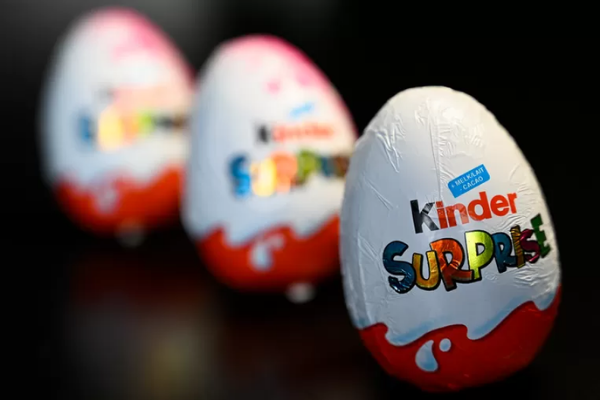Out of 125 cases of Salmonella linked to Kinder chocolate products in Europe, a number of children have now been hospitalised, according to the spokesperson for Belgian food agency FASFC.
The victims are mainly young, as the chocolate eggs are popular Easter treats among younger people, and around 20 cases have been found in Belgium.
Bacteria in Belgium
The products concerned were produced in a Ferrero factory in Aarlen, Belgium, where the bacteria linked to Salmonella has been found in the self-check phase of the production line.
“Every company in the food chain must itself control everything it buys, manufactures and sells,” Jean-Sébastien Walhin, FASFC's spokesperson said.
However, the link with bacteria spotted in the factory has not formally been established yet. “We need to analyse the genome of the bacteria found in the stools of these patients,” Walhin added.
Chocolate manufacturer Ferrero, which owns the Kinder brand, has recalled many Kinder products around the EU, as well as Australia and Switzerland on Thursday morning, due to their probable Salmonella contamination.
A joint investigation has been opened by both European Food Safety Authority (EFSA) and the European Centre for Disease Prevention and Control (ECDC), as over 125 cases of Salmonellosis — an infection with Salmonella — have been linked to Ferrero products in the EU and UK, mostly involving children under the age of 10.
Ferrero's responsibility
The Ferrero company reported on Thursday that the presence of salmonella was detected on December 15 at the Aarlen site, in a filter at the outlet of the two raw material tanks. The materials and finished products had been halted and not delivered to selling outlets, according to Ferrero.
The company confirmed that the matter is being investigated in collaboration with food safety authorities. Ferrero also added that the filter has been removed and that the level of control on semi-finished and finished products has “significantly increased”.
To avoid any risk, Walhin said the FASFC asked Ferrero to recall all the products with a margin. “Products coming from the factory today are no longer contaminated. Each batch is analysed and, if the result is satisfactory, the batch is released.”
But even if the self-check was carried out by Ferrero, there are still several shortcomings. “We are talking about more than 100 cases in Europe, it is not trivial. We try to protect consumers, especially when they are children. Some have been hospitalised,” Walhin said.
Related News
- 20 salmonella cases linked to Kinder Surprise eggs in Belgium
- Death of two French children linked to frozen pizza also sold in Belgium
He also criticised Ferrero for being irresponsible in its customer relations, as many customers could not reach the company. “Our contact point employees received more than 1,500 calls from consumers, many of whom could not reach Ferrero.”
Ferrero is risking fines in the case there have been breaches, the FASFC said, which can go “as far as a file being sent to the judicial authorities”.
Moreover, people who have purchased Ferrero products should check the labels and not consume them if their products are among the affected ones. Regarding the reimbursement of these products, nothing is guaranteed, according to the FASFC.
Severe salmonella
Salmonella is a bacteria that can cause a salmonellosis infection. Though there are different types of salmonella, it usually results in a common infection that heals without treatment. If symptoms are severe, a doctor should be consulted to initiate treatment.
Possible symptoms of salmonellosis include fever, abdominal cramps and diarrhoea within 6 to 72 hours after consumption of the contaminated food.
Young children, pregnant women, people with reduced resistance and the elderly are at greater risk of developing symptoms.
Most people recover within four to seven days without antibiotic treatment, however, some people with severe diarrhoea may need to be hospitalised or take antibiotics.
Affected products
The concerned products are the following:
- Kinder Surprise 20g and 3x20g with an expiry date between 11/07/22 and 7/10/22
- Kinder Surprise Maxi with an expiry date between 10/08/22 and 10/09/22
- Schoko Vouchers with an expiry date between 10/08/22 and 10/09/22
- Kinder Mini Eggs with an expiry date between 10/08/22 and 10/09/22

